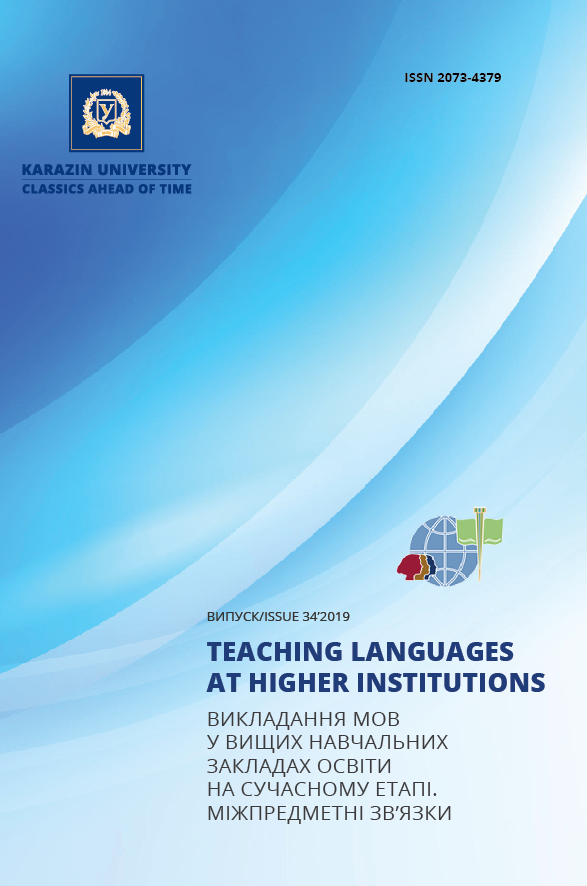Implementation of multimedia technologies in the educational process: problems and prospects
Abstract
The article deals with the issue of the development of higher education, the formation of a new model of educational process in non-philological higher schools. It is noted that the new model of educational process is focused on active modernization of education, improving the quality of education, more efficient use of training time and satisfying the needs of each student in accordance with his individual abilities through the use of information technologies in the educational process.
Today the task of most linguistic departments and language training centers for foreign students of higher education in Ukraine is to search and develop innovative teaching technologies and advanced forms and methods of teaching students, the introduction of the results of advanced world scientific schools into the practice of teaching non-native language.
The urgency of the problem lies in the fact that in today’s demanding and rapidly changing environment, the level of education depends to a large extent on the effectiveness of the introduction of modern technologies into learning, based on new methodological principles, modern didactic principles and psychological and pedagogical theories. Of course, computer does not replace the teacher, but is only a means of carrying out a pedagogical activity, his assistant. However, it should be noted that when using multimedia, the role of a teacher changes significantly: he begins to use teaching time more effectively, focusing on individual assistance to students, on the discussion of information, on the development of their creative approach.
Despite the large number of new educational technologies, one should not consider any of them as self-sufficient. Perhaps the one that integrates a complex of achievements of several methods, that is transformed depending on the methodological preferences, the content of the discipline, the equipping of the educational process, the level of students, the level of professional training, will be the most effective.
Downloads
References
Antonova, O.E. (2015). Pedahohichni tekhnolohiyi ta yikh klasyfikatsiya yak naukova problema [Pedagogical technologies and their classification as a scientific problem]. Filimonova, T.V. and Tarnavska, S.V. (Comps.). Kyiv [in Ukrainian].
Bondarenko, V. (2011). Innovatsiyni tekhnolohiyi yak faktor rozvytku suchasnykh informatsiynykh komunikatsiy informatsiyno-analitychnoho obsluhovuvannya dystantnykh korystuvachiv biblioteky [Innovative technologies as a factor of development of modern information communications of information and analytical service of distant library users]. Naukovi pratsi Natsionalnoyi biblioteky Ukrayiny im. V.I. Vernadskoho [Scientific works of V.I. Vernadsky National Library of Ukraine]. Kyiv, 32, pp. 207–221 [in Ukrainian].
Lalak, N.V. (2017). Interaktyvna model navchannya studentiv: problemy ta perspektyvy [Interactive model of student learning: challenges and perspectives]. Naukovyy visnyk Uzhhorodskoho natsionalnoho universytetu: Seriya “Pedahohika. Sotsialna robota” [Scientific bulletin of Uzhgorod National University: Series “Pedagogy. Social work”], 1 (27), 20, pp. 69–70 [in Ukrainian].
Martynova, I. (2016). Zaprovadzhennya innovatsiynykh pedahohichnykh tekhnolohiy yak zasib rozvytku tvorchoho potentsialu pedahoha [Introduction of innovative pedagogical technologies as a means of developing the creative potential of a teacher]. Nova pedahohichna dumka [New pedagogical thought], 4 (88), pp. 18–22 [in Ukrainian].
Mykhnenko, H.YE. (2017). Informatsyonnyi resurs systemy dystantsyonnoho obuchenyya kak instrument formyrovaniya intellektualnoi mobylnosti budushchikh inzhenerov [Information resource of the distance learning system as an instrument for the formation of intellectual mobility of future engineers]. Vyshcha osvita Ukrayiny u koneksti intehratsiyi yevropeyskoho osvitnoho prostoru [Higher education of Ukraine in the final integration of the European educational space]. Kyiv: Hnozys, 37 – 1, Vol. (73), pp. 185–195 [in Ukrainian].
Tkachenko, O.YU. (2017). Vykorystannya informatsiynykh tekhnolohiy u protsesi formuvanya komunikatyvnykh navychok inozemnykh studentiv [The use of information technology in the process of developing the communication skills of foreign students]. In: Metodolohiya ta praktyka linhvistychnoyi pidhotovky inozemnykh studentiv: zb. mater. Vseukr. Nauk.-prakt. konf. [The Ukrainian Science-practice conference “Methodology and practice of linguistic preparation of foreign students”]. Kharkiv: Kharkiv National Medical University, pp. 289–293 [in Ukrainian].
Vasetska, L.I. (2017). Navchalno-metodychnyy kompleks yak osnova optymizatsiyi movnoyi pidhotovky inozemnykh studentiv u nefilolohichnomu VNZ (iz dosvidu roboty kafedry movnoyi pidhotovky ZDMU) [Educational and methodical complex as the basis of optimization of language preparation of foreign students in non-philological higher educational institutions (from the experience of the Department of Language Preparation of ZSMU)]. In: Novitni pedahohichni tekhnolohiyi u vykladanni mov inozemnym studetam: Zb. materialiv Vseukrayinskoho naukovo-metodychnoho seminaru [The All-Ukrainian scientific and methodical seminar “The Newest pedagogical technologies in teaching languages to foreign students”]. Kharkiv, pp. 45–52 [in Ukrainian].

